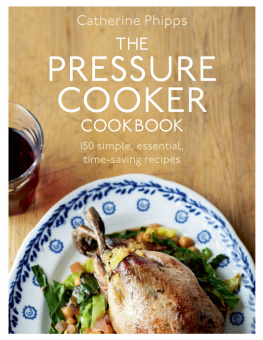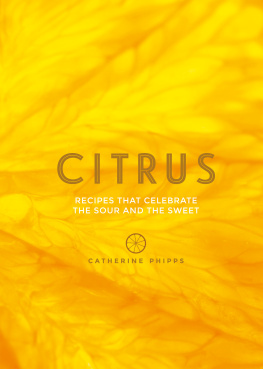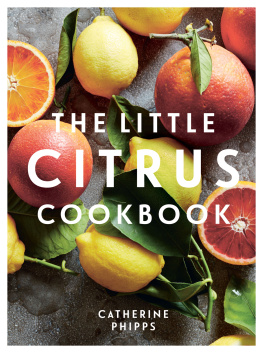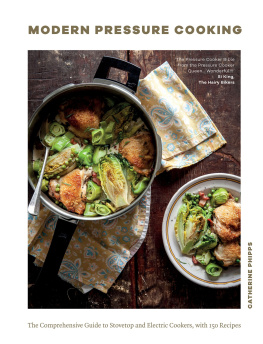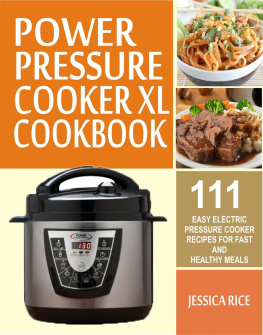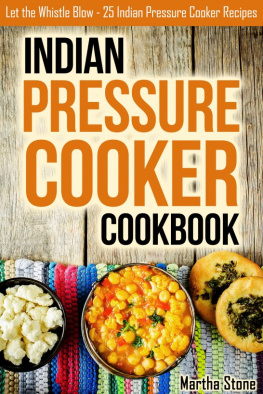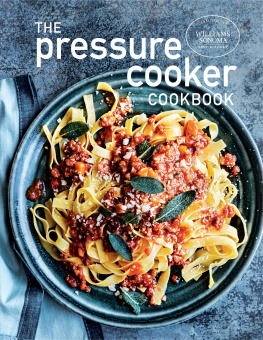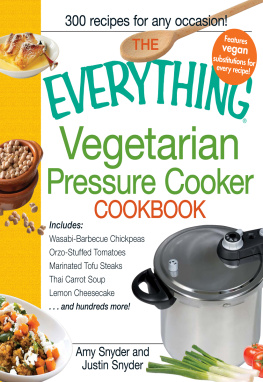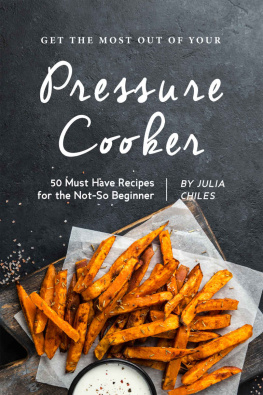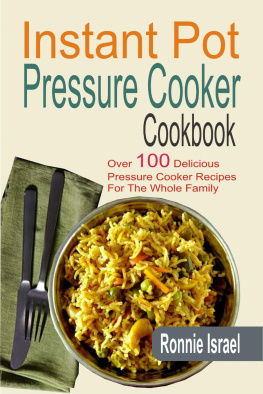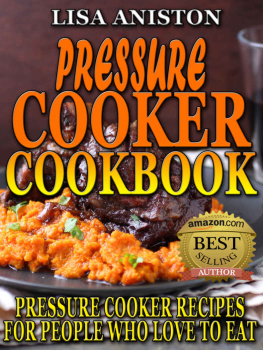Catherine Phipps - The Pressure Cooker Cookbook
Here you can read online Catherine Phipps - The Pressure Cooker Cookbook full text of the book (entire story) in english for free. Download pdf and epub, get meaning, cover and reviews about this ebook. year: 2012, publisher: Ebury Publishing, genre: Home and family. Description of the work, (preface) as well as reviews are available. Best literature library LitArk.com created for fans of good reading and offers a wide selection of genres:
Romance novel
Science fiction
Adventure
Detective
Science
History
Home and family
Prose
Art
Politics
Computer
Non-fiction
Religion
Business
Children
Humor
Choose a favorite category and find really read worthwhile books. Enjoy immersion in the world of imagination, feel the emotions of the characters or learn something new for yourself, make an fascinating discovery.
- Book:The Pressure Cooker Cookbook
- Author:
- Publisher:Ebury Publishing
- Genre:
- Year:2012
- Rating:4 / 5
- Favourites:Add to favourites
- Your mark:
- 80
- 1
- 2
- 3
- 4
- 5
The Pressure Cooker Cookbook: summary, description and annotation
We offer to read an annotation, description, summary or preface (depends on what the author of the book "The Pressure Cooker Cookbook" wrote himself). If you haven't found the necessary information about the book — write in the comments, we will try to find it.
The Pressure Cooker Cookbook — read online for free the complete book (whole text) full work
Below is the text of the book, divided by pages. System saving the place of the last page read, allows you to conveniently read the book "The Pressure Cooker Cookbook" online for free, without having to search again every time where you left off. Put a bookmark, and you can go to the page where you finished reading at any time.
Font size:
Interval:
Bookmark:
Contents

To Shariq
Introduction
I now cant imagine cooking without one. The benefits are enormous. Most cooking times are reduced by a huge 70 per cent with no sacrifice to taste
Why Pressure Cookers?
A few years ago, I had an almost Damascene conversion to cooking with pressure cookers. Until then, I had held quite a negative view of them were they not old-fashioned, noisy, dangerous beasties, belching out steam and terrorising our mothers and grandmothers with a constant threat of explosion?
Well, no. At least, not any more. I started to take them seriously on the day I watched my Brazilian sister-in-law use a pressure cooker to produce a delicious meal of black beans with sausages (see my version of her recipe ). The beans were dry and unsoaked, yet the dish was on the table in just over half an hour. This seemed miraculous to me, so it wasnt long before Id bought my own cooker and started experimenting. I soon discovered that todays models are very different from the sort I had grown up with. They are sleek, stainless steel and highly efficient, with numerous safety features.
I now cant imagine cooking without one. The benefits are enormous. The mere fact that most cooking times are reduced by a huge 70 per cent is enough, but think of what else that means. These days, when we are all short of time, when we are battling with escalating fuel bills (at the time of writing my supplier had just put mine up by 18 per cent) and rising food prices, as well as being put under pressure (no pun intended) to cut our carbon emissions, a pressure cooker is an invaluable tool. Not only does it save you time and fuel, but it means that you can save money by buying cheap cuts of meat and dried goods instead of tinned, and not have to worry that you are spending a small fortune having to cook them slowly. They have known this in the developing world for a long time, which is why almost every home in Central Asia and South America has one.
Another reason why pressure cookers are popular in hot climates is because they keep kitchens cooler by cutting cooking times and minimising oven use. So while they are particularly good with all those winter foods (stews, casseroles, steamed puddings), they are also ideal for summer use. They can speed up the process of preserving, and I even use mine to make food for picnics, salads and light, summery puddings. You can also use them outdoors. If I were the sort of person who enjoyed camping, I couldnt imagine anything more useful to take with me youd be able to make your campfire or portable gas ring go much further.
Most importantly to me as a lover of good food, there is no sacrifice to taste. If there is one myth I would like to dispel about pressure cookers, it would be this. There is no compromise necessary; taste and texture will always be as good in fact, in some instances the food actually tastes better. Some of our most respected chefs cottoned on to this a while ago. If Heston Blumenthal thinks that pressure cooker stocks and sauces are superior to those made conventionally, who are we to argue? The number of chefs who now admit to using a pressure cooker in their kitchens is growing, on both sides of the Atlantic, and they are even cropping up on popular cooking shows and competitions. People have finally realised that using a pressure cooker hugely increases ones options, especially when you are short of time. And its not all about tough cuts of meat and pulses. You will find recipes here that speed up braising, steaming, sauteing, pot roasting, even baking and double boiling (using the pressure cooker as a bain marie).
I am influenced by all kinds of things in my cooking friends and family, places I have lived, and simply what food is available to me locally, but most of all by the need to feed a hungry, growing family without resorting to convenience foods. These influences are reflected in my recipes, which I hope will show you how versatile the pressure cooker can be. Along the way Ive also attempted to give you hints and tips on how to convert your own favourite recipes for the pressure cooker. These days, my pressure cooker takes up permanent residence on the hob, because it is a rare day when it isnt used in some way. I hope that the recipes in this book will go some way to encouraging you to use yours just as much.
How to Use Your Pressure Cooker Safely
The principle behind pressure cooking is quite a simple one. Basically, the pressure cookers lid is weighted down and sealed with a gasket, which means that steam is prevented from escaping. The steam builds up in the cooker, increasing the pressure and therefore the temperature, which will exceed boiling point and cook the food at around 122C when the pressure is at its highest, reducing cooking times by about two-thirds.
In the bad old days, when pressure cookers had a fearsome reputation, pressure would build up and cookers would jiggle around alarmingly and very occasionally this is the stuff urban myths are made of explode! This doesnt happen these days as modern pressure cookers have many safety features, not least more than one safety valve to ensure that excess steam can be safely and automatically released when necessary.
This does not mean you should be cavalier in your treatment of your pressure cooker! Some basic, common-sense guidelines should be followed:
- Always read the user manual and follow the instructions on how to operate and maintain your cooker. Pay particular attention to the safety features you will need to oil the rubber gasket regularly and check for splits, and the valves need checking for blockages, especially after cooking anything that foams (starchy foods such as pasta and pulses).
- Never force the pressure cooker open before the pressure has completely dropped. I stupidly, if deliberately, tried this once to see what would happen and ended up with a scalded hand and boiling water all over the floor. If the pressure gauge is still up, the contents of the cooker will still be cooking at pressure, which means that any liquids will be fiercely boiling.
- When releasing pressure, always make sure that the cooker is tilting slightly away from you, so as to avoid getting a faceful of steam. The steam can be hot enough to scald so do be careful.
- Do not leave your pressure cooker unattended!
Which Pressure Cooker?
These days there are numerous pressure cookers to choose from they vary enormously in terms of price and quality, from standard aluminium to sleek stainless-steel models with all kinds of safety valves and visual pressure gauges. During the course of writing this book, I tried around a dozen different kinds, including electric models. I am happy using most of them, but have my preferences of course. I always find myself reaching for either a WMF or Fissler model, which really are top of the range. However, the keenly priced Prestige is also a very reliable option. If you havent yet bought a pressure cooker (and I really hope this book encourages you to do so), here are a few things you should consider before deciding which one to buy.
Size Matters
Many pressure cooker manufacturers say that a 4- or 4.5-litre capacity cooker is a good all-rounder and large enough for a regular familys needs. This is for the most part true. However, I would say that if you really want to maximise your savings in terms of time and fuel, the next size up (6 or 6.5 litres) is a much better purchase. It is not much more expensive to buy and you will have the advantage of being able to cook double quantities of all sorts of things. This means that you can effectively cook more than one meal at a time or cook in bulk to stock up the freezer. You will also be able to make larger quantities of stock not many beef bones will fit into a 4-litre pot.
Next pageFont size:
Interval:
Bookmark:
Similar books «The Pressure Cooker Cookbook»
Look at similar books to The Pressure Cooker Cookbook. We have selected literature similar in name and meaning in the hope of providing readers with more options to find new, interesting, not yet read works.
Discussion, reviews of the book The Pressure Cooker Cookbook and just readers' own opinions. Leave your comments, write what you think about the work, its meaning or the main characters. Specify what exactly you liked and what you didn't like, and why you think so.

